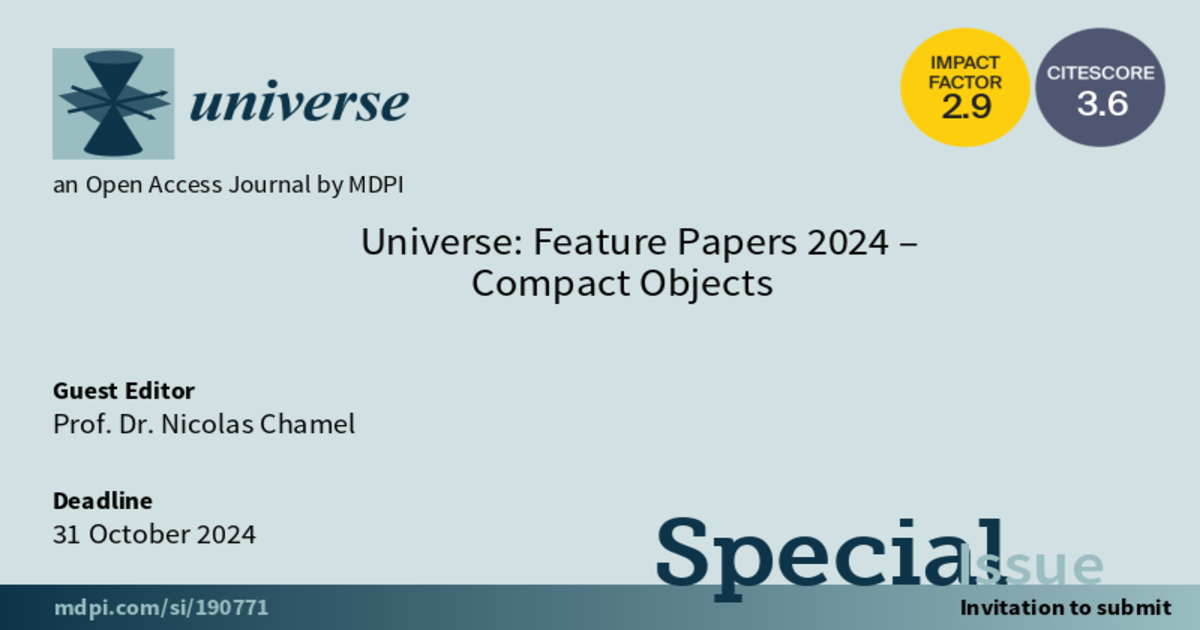Universe: Feature Papers 2024 – Compact Objects
A special issue of Universe (ISSN 2218-1997). This special issue belongs to the section "Compact Objects".
Deadline for manuscript submissions: 31 October 2024 | Viewed by 840

Special Issue Editor
Interests: neutron stars; pulsars; dense matter; quantum condensates; gravitation
Special Issues, Collections and Topics in MDPI journals
Special Issue Information
Dear Colleagues,
Compact objects, ranging from white dwarfs to neutron stars and black holes, are the most known exotic celestial entities in the universe and manifest themselves through a very large variety of different astrophysical sources and phenomena. Their observations provide a unique testing ground for many branches of theoretical physics, from the properties of matter under extreme conditions experimentally inaccessible on Earth, to the nature of space and time in the strongest gravitational fields. These remnants of stellar evolution also contribute to the origin of heavy elements through nucleosynthesis processes triggered by cataclysmic events such as magnetar giant flares, gravitational core-collapse supernova explosions or binary neutron star mergers.
Over the past few years, the rapid development of multimessenger astronomy, combining various kinds of observations from ground-based optical telescopes to radio telescopes, gravitational-wave interferometers, neutrino detectors and space-based observatories such as X-ray satellites, has brought new insights into compact objects and revealed their different facets.
The aim of this Special Issue is to collect recent advances in the observational and theoretical astrophysics of white dwarfs, neutron stars, black holes and more speculative objects yet to be discovered such as quark stars or dark-matter-admixed neutron stars.
Prof. Dr. Nicolas Chamel
Guest Editor
Manuscript Submission Information
Manuscripts should be submitted online at www.mdpi.com by registering and logging in to this website. Once you are registered, click here to go to the submission form. Manuscripts can be submitted until the deadline. All submissions that pass pre-check are peer-reviewed. Accepted papers will be published continuously in the journal (as soon as accepted) and will be listed together on the special issue website. Research articles, review articles as well as short communications are invited. For planned papers, a title and short abstract (about 100 words) can be sent to the Editorial Office for announcement on this website.
Submitted manuscripts should not have been published previously, nor be under consideration for publication elsewhere (except conference proceedings papers). All manuscripts are thoroughly refereed through a single-blind peer-review process. A guide for authors and other relevant information for submission of manuscripts is available on the Instructions for Authors page. Universe is an international peer-reviewed open access monthly journal published by MDPI.
Please visit the Instructions for Authors page before submitting a manuscript. Submitted papers should be well formatted and use good English. Authors may use MDPI's English editing service prior to publication or during author revisions.
Keywords
- compact object
- neutron star
- pulsar
- magnetar
- white dwarf
- black hole
- X-ray binary





